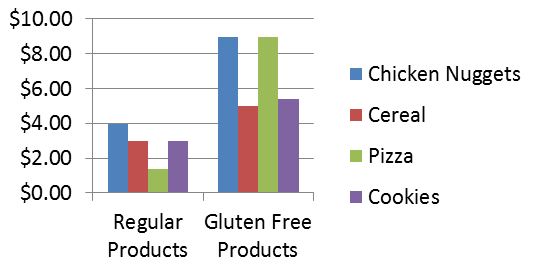Blog

As a dietetic intern, I get frequent questions about gluten free diets. Most of these questions have been prompted by articles on Facebook, websites and celebrity’s books. I can’t believe all the claims being made for gluten free diets such as, gluten free diets help with weight loss, increase energy and concentration, improve autism and rheumatoid arthritis, and in general are supposed to be healthier.
What is gluten? Gluten is a protein found in wheat, barley, rye, and some oats. Food we consume everyday like cookies, cakes, pizza, pasta, cereals and breads have gluten in them.
Approximately 1% of the population has a medical condition called celiac disease or non-celiac gluten sensitivity. Celiac disease is an autoimmune disorder that damages the small intestine lining and prevents absorption of nutrients from foods that are consumed. The damage is due to a reaction of eating gluten.
Most of us will not benefit from a gluten free diet. There is no current evidence that eating a gluten free diet will help with weight loss or is a healthier diet in general. In addition, not consuming these food products means you may be lacking essential nutrients like iron, thiamine, riboflavin, niacin, folate and fiber in your diet.
Interestingly, research has shown that gluten free products are higher in fat. Looking at the nutrition of a regular vs. a gluten free food product; 1 slice of regular multigrain bread has 120 calories, 1 gram of total fat and has 12% of your daily fiber intake and 15% of your daily intake of iron (based on 2,000 calorie diet). Gluten free multigrain bread has 80 calories, 3.5 grams of total fat, 4 % of your daily fiber intake and 2 % of your daily iron intake.
The cost of eating gluten free products is significantly higher. Gluten free products cost 242% more than regular products and lack variety. The graph below shows the food cost comparison of regular items vs. gluten free items.
So before you consider switching to a gluten free diet, consider saving money and eating non- gluten free foods that provide you with excellent nutrition and health benefits. Also, if you have symptoms of celiac disease (gas, bloating, diarrhea, weight loss/gain, fatigue) contact your healthcare provider to set up an appointment for appropriate screening.
The Mythbusters poster was created by an ISU nutrition class. Let’s bust the myths!
True or False?
Gluten free diet is a healthier diet for everyone.
Gluten free products have fewer calories.
Gluten containing grains contribute to more than 75% of typical daily grain consumption.
Celiac disease is a food allergy.
Celiac disease is easy to diagnosis.
Gluten free diet can compromise gut immunity.



